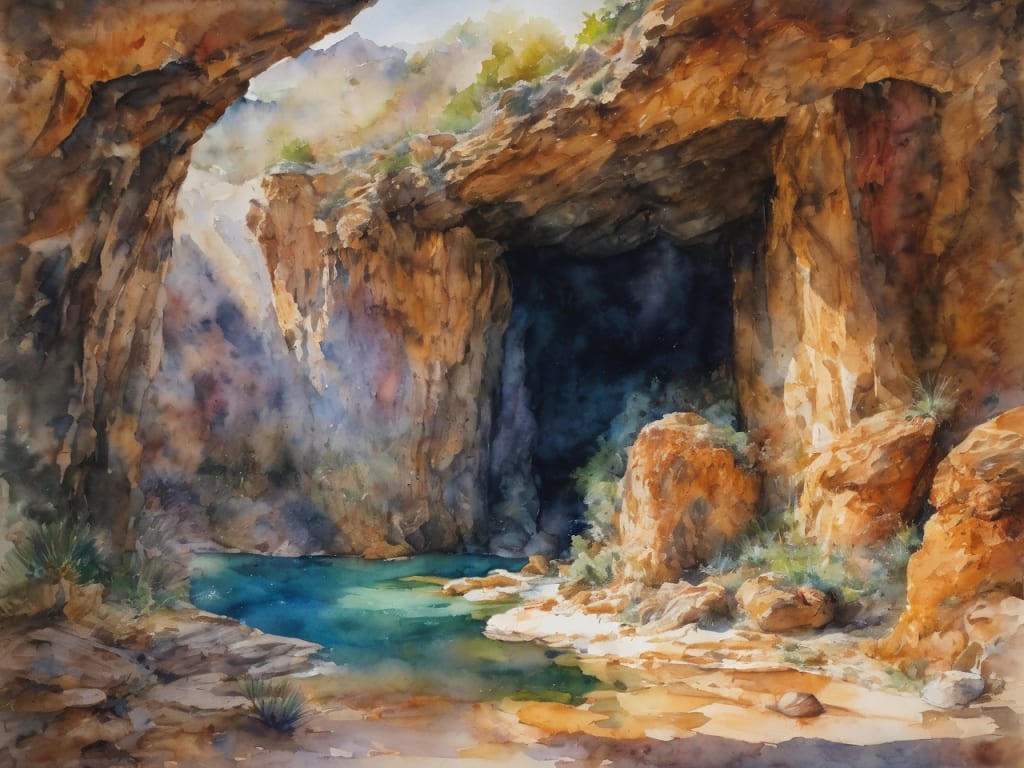
In the ancient corridors of philosophical thought, Plato's Allegory of the Cave stands as a timeless beacon, casting its shadows across the vast landscape of human understanding. Crafted by the illustrious Greek philosopher in his seminal work "The Republic," this allegory serves not merely as a narrative curiosity but as a profound reflection on the nature of reality, perception, and the transformative power of enlightenment. As we embark on a journey to unearth the allegory's echoes in our daily lives, we find that its profound insights continue to illuminate the intricate tapestry of human existence.
The Shadows on the Wall: A Journey into the Allegory
Plato invites us to envision a dark cave wherein prisoners, bound and restricted since birth, are fixated on a wall illuminated by a flickering fire. Unbeknownst to these captives, puppeteers behind them cast shadows of various objects, creating a distorted reality that becomes their sole perception of the world. The prisoners, having never glimpsed the true source of these shadows, mistake the illusions for reality, constructing a version of the world based solely on the shadows on the cave wall.
The Allegory unfolds as one prisoner is freed and exposed to the blinding light of the external world. Initially overwhelmed and blinded by the sunlight, this freed prisoner gradually acclimates to the true reality outside the cave. Upon realizing the illusory nature of the shadows, the freed prisoner feels compelled to return to the cave and liberate the others. However, the prisoners, accustomed to their shadowy existence, resist the newcomer's attempts to enlighten them, clinging to the familiar illusions rather than embracing the unsettling truth.
Everyday Shadows: The Illusions We Inhabit
As we navigate the complexities of modern life, the Allegory of the Cave finds poignant resonance in the shadows that subtly shape our perception and understanding of the world. Consider the pervasive influence of media, where narratives and images often serve as our cave wall, casting shadows that mold our beliefs, opinions, and even our sense of self. In an era dominated by digital screens, the shadows of curated content and filtered realities become the puppeteers shaping our worldview.
Similarly, societal norms and cultural expectations can be viewed as the shadows on our cave wall. From an early age, we are exposed to predefined notions of success, beauty, and morality. These societal constructs, often unquestioned, become the shadows that shape our aspirations and judgments. The Allegory prompts us to question whether our perceptions are authentic or mere reflections of inherited beliefs.
The Journey to Enlightenment: Personal and Collective
Plato's Allegory not only sheds light on individual enlightenment but also on the collective journey toward truth and self-awareness. In our personal quests for knowledge and self-discovery, we encounter moments that mirror the freed prisoner's emergence into the sunlight. The pursuit of education, self-reflection, and diverse experiences becomes a metaphorical ascent from the shadows of ignorance toward the illuminating light of understanding.
On a collective level, societal progress and transformation demand a shared commitment to embracing uncomfortable truths. The allegory challenges us to question entrenched systems, ideologies, and power structures that may cast shadows over justice, equality, and human rights. Just as the freed prisoner faces resistance in the cave, those advocating for social change often encounter opposition from those comfortable with the familiar shadows.
The Illusion of Certainty: Shadows in the Pursuit of Knowledge
In the realm of knowledge and science, the Allegory of the Cave invites contemplation on the limitations of our understanding. While scientific discoveries continuously unveil new layers of reality, the shadows of incomplete knowledge persist. The allegory prompts us to recognize that our current understanding of the world may be akin to shadows on the wall, awaiting the enlightenment that comes with further exploration and discovery.
Scientific paradigms, too, can function as cave walls, casting shadows that define our worldview until a revolutionary shift in understanding occurs. The Allegory challenges us to remain open-minded, acknowledging that the pursuit of knowledge requires a constant willingness to question and reassess our current understanding.
Escaping the Chains: Breaking Free from Mental Prisons
Plato's Allegory serves as a powerful metaphor for breaking free from the mental prisons we construct for ourselves. The shadows of self-doubt, limiting beliefs, and fear cast veils over our potential, confining us to the cave of our comfort zones. The journey toward self-realization involves confronting these shadows, challenging the narratives that bind us, and stepping into the blinding light of personal growth.
In the realm of mental health, the allegory resonates with the struggles individuals face in confronting the shadows of anxiety, depression, and trauma. Breaking free from these internal caves requires a courageous journey toward self-discovery, therapy, and resilience—a process akin to stepping into the light of understanding and healing.
The Dangers of Apathy: The Prisoners' Reluctance to Change
The reluctance of the prisoners to embrace the freed individual's enlightenment speaks to the inertia of the status quo and the resistance to change. In our societies, where systemic issues persist, the Allegory becomes a mirror reflecting the dangers of collective apathy. Just as the prisoners prefer the familiar shadows to the unsettling truth, societies may resist transformative change, clinging to structures that perpetuate inequality and injustice.
The Allegory prompts us to question our own resistance to change and growth. Are we, too, clinging to the comfort of familiar shadows, avoiding the discomfort that comes with confronting inconvenient truths? The call to collective enlightenment echoes through the ages, challenging us to dismantle the chains that bind us to outdated ideologies and prejudices.
Education as Liberation: The Role of Philosophers
In Plato's Allegory, the philosopher emerges as the catalyst for enlightenment, the one who descends into the cave and seeks to liberate the prisoners. The role of education and philosophy becomes pivotal in guiding individuals and societies toward a more profound understanding of reality.
In our contemporary context, educators, thought leaders, and influencers take on the mantle of the philosopher, endeavoring to illuminate minds and challenge prevailing narratives. The Allegory inspires us to recognize the transformative power of education in dispelling shadows, fostering critical thinking, and nurturing a collective commitment to truth.
Conclusion: Embracing the Light of Truth
As we reflect on the Allegory of the Cave in the context of our daily lives, its profound relevance becomes increasingly evident. Plato's timeless metaphor encourages us to question the shadows that shape our perceptions, challenge the status quo, and embark on a journey toward personal and collective enlightenment.
In the intricate dance of shadows and light, we find the essence of the human experience. The Allegory serves as a guiding beacon, urging us to cast aside the chains of ignorance, confront uncomfortable truths, and embrace the blinding light of truth. In doing so, we honor the legacy of Plato's philosophical wisdom and embark on a journey of continuous self-discovery and enlightenment—one that transcends the boundaries of time and resonates through the ages.
About the Creator
Kei Ben
A fresh read goes a long way.






Comments
Kei Ben is not accepting comments at the moment
Want to show your support? Send them a one-off tip.